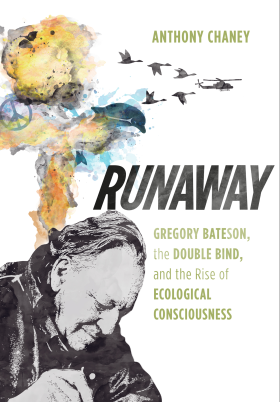The Book
Runaway: Gregory Bateson, the Double Bind, and the Rise of Ecological Consciousness
The Author(s)
Anthony Chaney
Editor's Note
This is part two of the Runaway roundtable. Part one can be found here.

“Cherish your exceptions,” Gregory Bateson learned from his father, the British naturalist William Bateson. Bateson the elder was speaking of studying natural specimens that did not fit the norm, but he might have been speaking of his son, who never quite fit the protocols of specialization that emerged in Western science after the Second World War (113). Rigorously experimental, prodigiously interdisciplinary, Bateson is perhaps best known as a maverick inspiration to radicals of the 1960s and 70s, particularly in the developing radical environmental movement and the counterculture as a whole. But his career remains largely unknown beyond that and perhaps awareness of his marriage to Margaret Mead while she was writing Coming of Age in Samoa. Bateson is largely ignored or forgotten by scholars of postwar American and European thought. In a crisp, cogent, eloquent, and wide-ranging study, however, Anthony Chaney redresses this wrong, providing a sense of Gregory Bateson’s significance within the context of intellectual history during the second half of the twentieth century.
Fittingly for a book about an ecological systems theorist, Runaway locates Bateson in an intricate network of scholars, thinkers, activists and ideas. We can best understand Bateson, Chaney proposes, by tracing the larger interactions of his “communicative acts of discernment” (247), which is to say by locating him in a web of interactions with others. At times, a few of these figures—poet Allen Ginsberg, anthropologist Margaret Mead, the German psychologist Frieda Fromm-Reichmann, the radical English psychologist R.D. Laing, the cultural provocateur Emmett Grogan, American Black Power activist Stokely Carmichael (Kwame Ture)—almost threaten to hijack the book, to run away with the story of Runaway. Thankfully, Chaney brings us back to Bateson as a central figure in shaping intellectual responses to the looming problem of global environmental catastrophe caused by human activity. Bateson did so, according to Chaney, by formulating a late-twentieth century ecological consciousness in which “a more profound [emphasis in original] notion of responsibility without control” might replace “modern project of mastery over nature” (6). In doing so, Bateson “gave his audience a keyhole” into which they could peer at “a new ‘postmodern’ science of complexity and interrelatedness and, in turn, to a new accounting of reality” (3).
Because Bateson, as Chaney writes, “moved from discipline to discipline as the needs of his own intellectual inquiry demanded and within the limits that opportunity allowed,” his legacy has been difficult to trace (7). To address his importance, Chaney researches his life from Bateson’s childhood in England through his fertile intellectual partnership with Margaret Mead to his work helping the Allies during World War II to his participation in the Macy Conference gatherings of engineers and social scientists during the 1940s and 50s to his time studying dolphins in Waimanalo, Hawaii to his appearance at the 1967 Congress on the Dialectics of Liberation. Moving through these periods of Bateson’s life, Chaney concentrates intellectually on three of Bateson’s concepts: the “double bind,” the “runaway” system, and the “riddle of the Sphinx.” The first two were ways that Bateson identified problems in larger systems of human life; the last, Chaney contends, marked a way to move past these problems. First is the idea of a “double bind,” which arose from Bateson’s studies of the mentally ill during the 1950s and resembled the existential contradictions made famous by Sartre and Camus, the reimagining of original sin by Reinhold Niebuhr, and the catch-22 paradox at the heart of Joseph Heller’s absurdist World War II novel. The double bind registered not a “lose-lose” choice but an “impossible dilemma,” a kind of logical trap created by two incommensurable options: in Heller’s novel, for example, the pilot Yossarian decides to feign craziness to elude running seemingly suicidal missions, but then is told that since one would have to be crazy to fly them, he therefore qualifies for them. This kind of double bind, Bateson theorized by drawing on the work of Fromm-Reichmann, was possibly the cause of certain kinds of schizophrenia. It also led to a second concept as the cause of “runaway” systems driven toward imbalance and destruction. But an alternative to the double bind and its runaway systems appeared in what Bateson, using a famous phrase coined by the British jurist James Fitzjames Stephen and quoted by William James, called human confrontations with “riddle of the Sphinx” questions: what do you think of yourself? What do you think of the world? Who am I to you? Who are you to me? These questions offered modes of continual relational adjustment and, for Bateson, were key elements for potential feedback mechanisms that allowed systems to stay in functional balance.

Gregory Bateson
Bateson picked up on concepts of cybernetic feedback at the famous Macy Conferences. The most recent intellectual history to focus on these events is Fred Turner’s The Democratic Surround, which contends that they were key events at which intellectuals in the United States attempted to forge an American democratic order through uses of technological systems that could resist fascism.[i] Chaney grants the Macy Conferences their due as influential events, but sees as more significant an event that occurred a few years later: the 1967 Congress on the Dialectics of Liberation. Organized by R.D. Laing and his associates in London, the Congress witnessed fierce debates between freaks and politicos, or what Chaney calls the culturalists and the structuralists (10-11, 186). All agreed that some kind of action had to be taken to confront a Cold War system gone mad with ongoing nuclear arms race and the intensifying traumas of Vietnam, but they disagreed as to whether it should take a more personal (“change your mind”) or conventionally political (“change the system”) manifestation. Bateson’s theories suggested a synthesis at the conference by providing a vision of the problem of human agency within environmental systems, subsuming into the “ecological” both the cultural and the structural. His ideas made a big impact on figures such as Ginsberg and the aftermath of the Congress found Bateson making common cause with radical anarchist thinkers such as Paul Goodman.
For the most part, Chaney is successful at using Bateson’s life and thought as what he terms a “contextual vehicle” that can traverse the “emotional force field” surrounding what Richard Falk calls the “apocalyptic encounter” with the natural world’s limits that gave rise to an ecological consciousness by the late 1960s. One wonders, however, about whether there are other stories lurking behind or beyond this one. Bateson’s interdisciplinary wanderings, in particular, seem important. Some might accuse him if dilettantism except for how rigorous Bateson was, how committed he was to his own lines of thinking. As Chaney suggests by paying close attention to the Bateson family and in particular to William Bateson the father, perhaps what defined Gregory Bateson most of all was not that he was a harbinger of a postmodern ecological consciousness so much as a man of the nineteenth century, in particular the battles between Darwin and other naturalists who believed in evolution but debated some of Darwin’s key contentions about moving from the holistic level of the organism to genetic and cellular levels of being. Was Bateson not so much a mapper of the future as a remnant of the past, in particular of a past filled with paths not taken in scientific understandings of the self and the world and how they relate? Does he offer us not a prefiguration of ecological consciousness but a residue of lost scientific and intellectual positions worth revisiting, if not for in a scientific mode than at least with a philosophical and ethical sensibility?
In the end, Bateson’s reputation met a problem he himself identified: “When the investigator starts to probe unknown areas of the universe, the back end of the probe is always driven deep into his own vital parts.” Bateson was so preoccupied with his own explorations that awareness of his thinking has never been fully recognized. He has never received his full due for his adventurous intellectual inquiry. Yet his ideas have saturated the thinking of everything from the environmental movement to the techno-utopian Whole Earth Catalog wing of the counterculture to Silicon Valley’s continued interest in cybernetic modes of technological, and by extension social, engineering.
And what of that system that has emerged as more dominant in global society since the 1960s than any other: the neoliberal imagining of a so-called “free market”? Here too is a system portrayed as beyond the control of any one subject or actor, particularly state power. Is the free market, thought by its libertarian believers to be wisely complex and guided toward ultimate balance by invisible hands, also somehow part of the legacy of the ecological vision of consciousness? It is, after all, an order pictured as beyond the ken of any one participant—and supposedly all the better for it. We are enchained to the mysterious workings of this larger system. Yet within it, we all are told to seek freedom and liberty as unencumbered individuals. Talk about a catch 22!
Is this current form of capitalism the ultimate runaway in which we all, caught in its double bind, must continue to make our home? As our most dominant of contemporary systems continues to burn up the very atmosphere that gives us and it life, one wonders what exceptional things Bateson would have had to say about it.
[i] Fred Turner, The Democratic Surround: Multimedia and American Liberalism from World War II to the Psychedelic Sixties (University of Chicago Press, 2013).
About the Reviewer
Michael J. Kramer works at the intersection of historical scholarship, cultural criticism, the arts, and digital technology. He is the author of The Republic of Rock: Music and Citizenship in the Sixties Counterculture (Oxford University Press, 2013; paperback, 2017). For more information, visit michaeljkramer.net.

0